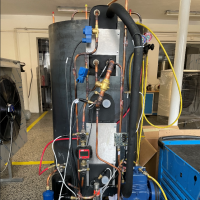

The CTU University Centre for Energy-Efficient Buildings, in cooperation with Tepelná pombra Mach, developed and commissioned an experimental stand for the charging circuit of a thermally integrated Carnot battery.
A Carnot battery is a device that stores excess electricity in the form of heat when there is an excess of it in the grid and its price is low, and on the contrary, it produces electricity when it is in short supply and its price rises. The thermal integration of the Carnot battery means the use of low-potential heat from industrial operations in order to increase their overall energy efficiency, which is relevant, for example, for tempering plants, plastic injection plants, wood processing or agricultural enterprises, etc.
The stand consists of a high-temperature heat pump and a heat accumulator working with stone dust. Condensation of the heat pump takes place directly in the accumulator with stone dust in order to achieve the most efficient heat transfer.
As part of the test operation of the device, we measure the technical parameters and at the same time verify the operating limits of the high-temperature heat pump, especially its compressor. For the needs of the laboratory experiment, we simulate this low-potential heat by means of a switched water heater regulated to the required temperature. This will be followed by reliability tests of compressor operation, measurement of dynamic characteristics of storage charging and temperature distribution in the volume of stone dust storage.
The development of a functional sample of an experimental device for testing the charging of a low-potential heat accumulator based on stone dust with a heat pump was supported by the Technological Agency of the Czech Republic as part of the TA CR Zéta IV project TJ04000326 Use of low-potential waste heat for electricity storage using the Carnot batteries concept.